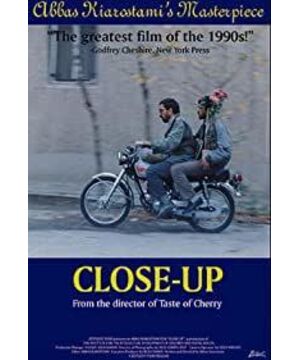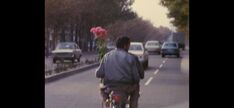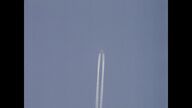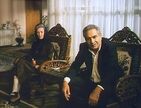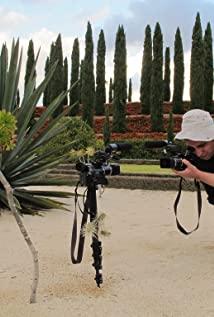A civil servant dressed in white and two soldiers got into a car and drove away.
Man in white: Do you have time?
Driver: Of course there is.
The man in white begins to introduce the main characters and specific events of the story.
This scene shows the identities of these people. The man in white is a reporter from Solshu Magazine. The driver used to be the Air Force and is now the driver. Self-deprecatingly used to be the Air Force, but now driving on land is considered the Army. Then it kept appearing to the left, the word (why?)
asking the way
(unshown boy, don't know)
the man who carried the pheasant, but he kept selling the pheasant in his hand
(unshown woman, know how to go)
reporter He learned about it from his friend and he was very excited about it.
(This reporter didn't do well, and hoped that the salted fish would turn around. They walked to the road pointed by the woman and found that it was a dead end. The reporter muttered to himself: It's a rare opportunity, but it still doesn't work. But in the end, we arrived at the destination, and the reporter explained some things and went in. The
driver and the soldier started chatting, and the driver was thinking about who paid for the car. The past, the change of identity, and the fate of these people were introduced.
(Why film this? Duan? Because of the contrast with the atmosphere inside the house, at this moment, the atmosphere inside the house is very tense, while the atmosphere outside is so relaxed)
After chatting for a while, an old man came out of the house and shook hands with the soldier, who watched Unloading the documents in the old man's hand, the old man's name is Ahengha, and then two soldiers went into the house with weapons.
The driver turned the car around, got out of the car, and wanted to see the situation in the house, but he couldn't see it. He looked up and looked up. When a fighter jet went straight to the sky (why did you shoot this?)
he saw some flowers in the pile of leaves, picked up a few, and when he finally picked up a flower that was pressed against a large leaf, he took down the spray paint can next to it, It fell to the ground, the driver gave a slight kick, and the spray paint can slowly rolled down the slope. (Crows cry)
The driver watched as the spray paint can rolled to a curb, then turned to put the flowers in the car.
The driver returned to the car. The door opened, a young man came out first, and ran to the side. The reporter came out. The reporter put his bag on the door and kept taking pictures. Soldiers and suspects also came out. Everyone got in the car. The reporter said that he forgot to take his bag, so he opened the door and went back to get it.
Ahengha lay on the window and told the suspect, I hope you can tell the truth, and I want to help.
Suspect asks: Am I suspected of theft or fraud?
Ahengha didn't answer. The young man just came back, and the reporter asked if he borrowed a tape recorder? The young man said he had asked, but he was not at home. The reporter said to be safe. He told the driver to go to the police station first, and the driver told him to pay first. (It turned out to be a taxi) The reporter didn't have enough money, so he turned to ask the old man Ah Heng Ha to borrow money to advance the fare.
(The reporter is very careless, the driver is more careful and only interested in money)
The driver drove away, and the reporter started to borrow a tape recorder. He didn't care to ask from house to house, but the plaintiff was very restrained (showing the attitude of social class, the plaintiff is a wealthy person in society, this area is a wealthy area, and the doors of every house are closed.) The reporter rang the doorbell, the plaintiff Said that the family did not know each other (actually it was the neighbor next door, who even said they did not know each other) and ran to another family. Someone in this family responded, and the plaintiff said it was wrong. In the end, the plaintiff got the tape recorder, the reporter ran back quickly, ran again quickly, kicked the spray paint can that had just rolled down, kicked very hard, the spray paint can flew very high, and finally fell back to the ground, changed. shape, keep rolling.
Titles. A newspaper printing press is working, making a rhythmic machine sound, subtitles, and the machine stops when the subtitles are finished. Displays the title and content of this story.
In 16 minutes
, an unidentified person found a general in the army and said that he had seen the incident in Solshu magazine. The suspect was Hussein Sabjian and wanted to know some questions about the incident. The general said it was two weeks ago, too busy to remember, but here is a magazine. A soldier who happened to be involved in the arrest was also there and asked some questions about the appearance of the suspect (because the appearance of the suspect who appeared on the scene just now was not clearly visible, which conformed to the audience's psychological expectations) and then asked the plaintiff's address. .
The picture cuts to the living room of Ah Hengha's house. Through Ahengha's words, I learned that the person who interviewed the general just now was Abbas. After a bunch of polite remarks, Ah Heng asked Abbas, what else do you want to know? A man next to him chimed in, (picture cut) (Mobilda) said that some of the opinions in the magazine are still not quite right, saying that they were too naive to be deceived, which is wrong, and then elaborated his point of view. Of course I am happy to see the director himself, but I am not deceived just like that. He studied architecture and couldn't find a job. His brother studied mechanical engineering, but then he started making bread. (His mother interrupted him and motioned not to talk.) He continued to say, bakery owner and artist, but also an artist OK, (explaining that they wanted to pursue art direction, they were tricked). Finally, Abbas asked them where the suspect is now, saying that he was in the detention center.
The screen cuts to the detention center, where the suspect appears. Sit face to face with Abbas. Abbas said he came to see him after reading the magazine. Abbas asked something about what happened after he was arrested, if he admitted to being a fraud, the suspect said yes, but with a reluctant expression. He said that it was his love for movies that he did such a thing. Finally, he hoped that Abbas would express his apologies to the director, Mav Malbaf, whom he pretended to be. His movies were his spiritual support. The suspect is gone. (The camera zooms slowly from far to close-up)
The picture cuts to the judge. Abbas interviewed him and asked about it. But the judge said that he couldn't remember, there were too many things, and Abbas gave a hint, and the judge said that the person next to him took over the incident.
The camera pans to a judge next to him. He remembered it. Abbas asked for an early trial time, and at the same time asked them to grant Abbas permission to enter the courtroom for filming. The judge said the case had no merit to be made into a movie, Abbas asked what would be worth it, and the judge said heavier crimes. After some debate, the judge said that as long as the superiors agreed, he had no opinion. Abbas and his party walked past the camera.
The slate hit the board, the court scene. The defendant took the seat, and the camera was aimed at the suspect. Abbas asked the suspect if he remembered where he had seen him? The suspect said he remembered. Abbas asked the suspect if he would mind filming the trial. The suspect did not mind, saying that everyone was a spectator. Abbas said there were two cameras at the scene, one for panoramic shots and one for close-ups.
At trial, the judge suggested that they settle, but the plaintiff refused. The plaintiff stated the defendant's criminal evidence, saying that fortunately, his father's wiseness and timely detection of the defendant's attempt prevented him from achieving his goal.
The picture cuts to the bus, where Hussein Sabjian gives up his seat to the person by the window, who wants to get off the bus, and the book in Hussein's hand flashes in front of the camera, showing that it is a cyclist. Hussein sat by the window and looked out the window. An old lady was sitting next to him, and the old lady saw the book in his hand. The old lady asked where did you buy this book? Hussein looked out the window, and the old lady said it twice before hearing it. Hussain said that he wrote the book, and the old lady knew the author of this book. This book is the same person as a film called The Cyclist. The old lady was very curious about the big director taking the bus. , Hussein said that he took the bus to collect materials. The old lady described the situation in his family. His youngest son is particularly obsessed with movies, his oldest son works in a bakery, they both want to work in art, and a daughter is in high school (Hussein looks up, it should be The direction of her daughter, her daughter is not pictured here) The two exchanged phone numbers and addresses, and Hussein got out of the car.
The screen switches to the courtroom. The judge asked the suspect, saying it was a fraud, what was he going to deceive? The plaintiff said that he took advantage of the director's reputation to take the initiative to visit our house, and he simply relied on the courage of a thief to step on the spot. (The picture shows a close-up of the old lady and her daughter.) The
judge asked the defendant if there was an attempt to defraud him?
The defendant said that he loved art and movies since he was a child. The judge asked why he was pretending to be Mav Malbaf?
The defendant said that because he described society, he also liked Abbas' travelers, saying that the people inside were very similar to him.
The judge told him not to stray from the topic, why pretend to be the groom Malbaf, what is the purpose?
Hussein said he just wanted to try to be a groom Malbaf.
The judge asked him what happened to the 1,900 yuan he asked for the plaintiff?
The plaintiff (Mobilda) told what happened, and the judge asked the defendant, why did he ask for money?
Abbas interjected, asking Hussein to explain the purpose of pretending to be the groom Malbaf. Hussain said that doing this can make him feel respected and enjoy this feeling, so he continued to act, and later he really felt that he was a director.
Abbas asked him if he had thought about paying back the money?
Hussein pondered for a while and said that he had thought about it, but he needed money to make a movie, and how to pay it back was very important, so he didn't pay it back.
The defendant said that on Thursday, Hussain called everyone together to see the Cyclist that was being shown. There is a movie theater nearby. Why did he go to the far one? From then on, he began to doubt him.
The judge asked if he could steal after letting everyone go to the movies? Hussein denied.
Abbas interjected, the intention of the theft is not obvious, why he called everyone to go to the movies, the purpose, please explain to Hussein.
Hussain said the reason for this was to make them more interested in the film, etc.
The judge asked how many days in total from recognition to arrest?
The plaintiff (Mobilda) said that he came for the first time on Tuesday, and said that he would be the protagonist. He also said that he would come back on Thursday, saying that he wanted to eat mutton stew.
The judge reminded again, the number of days.
The defendant said he came on Tuesday, then Thursday, and finally Saturday, and was arrested on the fifth day.
The judge asked what was the trigger?
(In a panorama, a person holding a microphone boom pointed the microphone at the plaintiff, and the courtroom was full of lights used for filming.)
The plaintiff (Mobilda) said that the family gradually became suspicious, especially the father, who began to become suspicious. , my father learned the truth after talking with Mr. Movsene.
54 minutes
Father (Ahengha) and Movseni are talking in the living room. Ahengha said that the first person who started to suspect was Mobilda, who was convinced that he was a fake. It was yesterday that he fully understood that he was a fake. Ahengha described the verification process. On Thursday, he called everyone to watch a movie together. After watching it, he said he would go to our house. We welcome him too. The next morning, he said he wanted to go to the mountains, Mobilda gave him a jacket, we all thought he was not coming back, but half an hour later, he called and said to wait for Mobilda in the square, and his son would pick him up Gone, almost back. Movseni said that a reporter who had a relationship with Mav Malbaf, Mr. Waltz Andu, would come today to see if this person is a fake. Ahengha got up, because he heard the sound of motorcycles outside the house, and they came back.
60 minutes
Hussein entered the room, shook hands with Mofu, sat down, and chatted with Mr. Ahengha.
Mobilda brought out the meal for Hussein. Hussein talked about the rehearsal, and Mobilda responded indifferently and left. Ahengha said that today is Friday, a day off, please finish work early. Hussain spoke about his passion for making movies. It's a shame to say that Mobilda lost her passion for acting. (The atmosphere becomes cold, there is a doorbell, Hussein looks surprised)
The old lady went to open the door, Ahengha said it was Mr. Waltz Antu, everyone got up, and finally Mofu sat down again, Ahengha went to open the door. Waltz stopped reporters from coming in, shook hands with everyone, sat down breathlessly, and then secretly glanced at Hussein twice. Hussein was in a low mood and already had a premonition in his heart. The reporter motioned Ah Hengha to take a step to speak. Hussain watched them go to the side, they said as they walked, they walked to another room, Mobilda came out, Hussein said to Mobilda, rehearse immediately, Mobilda asked him to go to dinner , Hussein sat back in his chair. Ahengha and the reporter came out of the room with a piece of paper and walked towards the door. Hussein sat in a chair with a hole in his sock.
1 hour 07 minutes (climax)
Hussein was sitting in a chair, worried. There was a sound of opening and closing the door. He looked in the direction of the sound. It was the old lady who went to the kitchen with a water glass. She glanced at Hussein as she walked. The whole world was extremely quiet.
Another door slammed, and Hussein walked to the window. Muff watched him walk past, and the crows chirped outside.
(Through the curtain, the criminal's point of view), Hussain looked at the porch outside the window, what Ahengha and the reporter were talking about, Ahengha walked to the gate, and turned back after a few steps. I told the reporter something, the reporter made a gesture of reassurance, Ahengha left, and the crow cried. The camera pans back to the reporter pacing back and forth in the doorway.
Hussain watched nervously for a while, then left the window, a sound of closing the door made him turn around. Muff paced the edge of the dining room in the room.
Hussein's breathing accelerated, and he stood by the window again, and saw the soldier and Ahengha walking back.
The door opened and the four came in together. The old lady in the kitchen also opened the door and came out. The camera panned to the table. Hussein was sitting on a chair and looking out the window. The reporter put his bag on the table and took out the camera. The soldiers walked over and arrested Hussein. The reporter Is there a tape recorder? Mobilda answered no.
As they walk out of the house, Muff goes to the window, Muff (with curtains drawn, viewer's point of view), sees better. Crow calls.
1 hour 10 minutes
court with a camera in the shot. The judge asked Hussein, is this the first time?
Hussein answered yes. Hussein used to work in a printing house. Hussein is reflecting. (The footage shows the plaintiff's two sons exchanging opinions with the people beside him, as if discussing something.) The judge asked the plaintiff again if he would forgive the defendant. If forgiven, the defendant can have a reduced sentence.
Mobilda said that he can be forgiven for his sincerity, but he feels he will repeat the same mistakes and play someone else next time. Said the reporter had other news there.
The reporter said that a woman called and said she was engaged to a man named Malbaf, a groom, because he could make her the heroine. The printing house also called and said that Hussein had committed some things before, such as collecting items on behalf of others.
Hussain said that he had a hunch about what happened this time. He said that he had to endure hunger to go to his aunt's house. He met Mrs. Ahengha on the way, dressed as a director, and they could entertain him with food (camera) It was aimed at the process of an old woman leaving the courtroom) although she had a hunch, she went anyway. Because you can get their respect, you can ask for their help. When I called them, I was a little afraid of being arrested, but when they came to pick me up with good intentions, there was hope. But when guests came and saw me surprised, I knew I was going to be arrested. Because it was expected, there was no resistance at all. At the police station, the notebook was taken out of the bag and it was all over, so I ripped it all off.
Abbas: How many days did you notice it?
Hussain: On the day of the boarding, they put out a magazine with pictures of the groom Malbaf on it for me to see.
Abbas: When are you going to play?
Hussein: The film is ready.
Mobilda: When he came on Thursday, his hair was all white, and the mav Malbaf's hair was much darker. When I exposed it, he was eager to explain that he was young when the photo was taken. He dyed his hair again on Saturday, is there any reason for that?
Hussein: I want to be younger. (The old lady who came in and just went out)
Judge: Where's your wife?
Hou: Divided
Judge: Why
Hou: Because of poverty
Judge: Do you have children
Hou: 2
Judges: Who will take care of it?
Hou: My mother
Abbas: Where?
Hou: At the back, the one in the black scarf (the old lady who just came in and out)
Judge: Do you know the reason for his divorce?
Mother Hou: I have work, sometimes I have it, sometimes I don't. Married for 7 years, because his wife Shishi couldn't stand this kind of poverty, they split up, two people take turns to take care of the children, and he still has to subsidize the family. Our family is decent, and he has no criminal record. Please forgive him.
Hussein: I hit a wall everywhere. I watch his movies over and over again, and carry his books with me. I feel like they were written for me, and my heart can be at peace.
Abbas: What would you do if you made a movie now?
Hou: My hardships can hone my acting skills.
Abbas: Are you still acting?
Hou: I'm talking about myself now, about my own pain, that's all, not acting.
Abbas: Why be a director, not an actor?
Hou: In front of them, I am acting, and directing is part of acting.
Abbas: What role do you want to play now?
Hou: Myself
Abbas: You have finally returned.
Hussein smiled thoughtfully.
Judge: Finally, do you have anything to say?
Hou: I deeply apologize to the Ahengha family and the court.
Judge: Will you commit the crime again?
Hou: No, I swear.
Mother Hou: Please forgive him.
The judge also interceded for him, and Ahengha said that as long as my son Mobilda forgives him, the case will be dropped. Mobilda said that his behavior is also related to the current social environment. We forgive him and withdraw the lawsuit.
At the end
of the car perspective, Abbas is talking, the street scene, the camera is tracking people. Mav Malbaf appeared, and his voice was intermittent. When Mafu Malbaf saw Hussein, Hussein burst into tears and knelt down to express his apology. The two got on Malbaf's motorcycle together, crossed a few blocks, and got out to buy flowers. The car drove to the door of Ahengha's house. Hussein went to ring the doorbell and reported his name. Ahengha didn't open the door. Hussein was so emotional that he was about to cry. Marv Malbaf stepped forward and rang the doorbell again, and after speaking, the door opened. It has been 40 days since I first came here. After a meeting, Ahengha opened the door. Mav Malbaf said, Hussein is another person now. Please look at each other with admiration. In the profile of Hussein bowing his head.
1 hour 37 minutes
View more about Close-Up reviews


